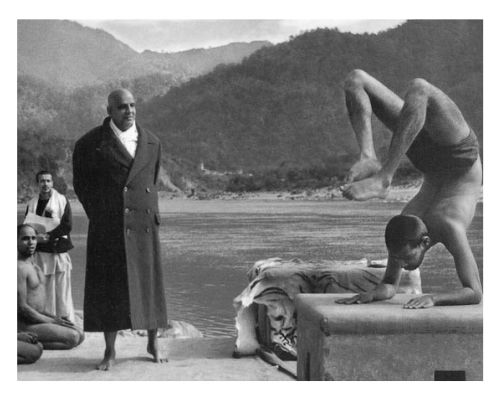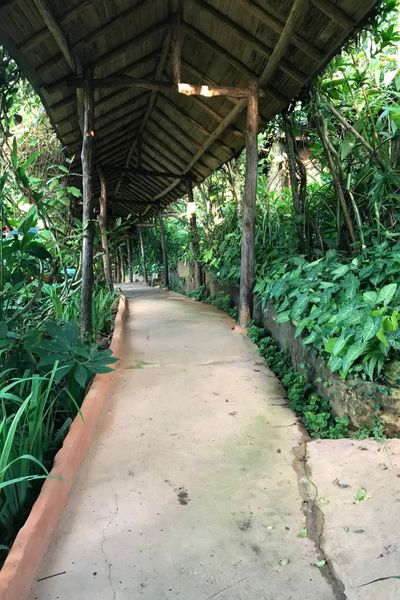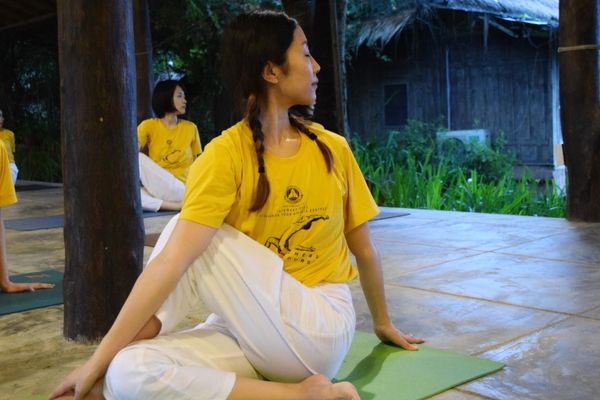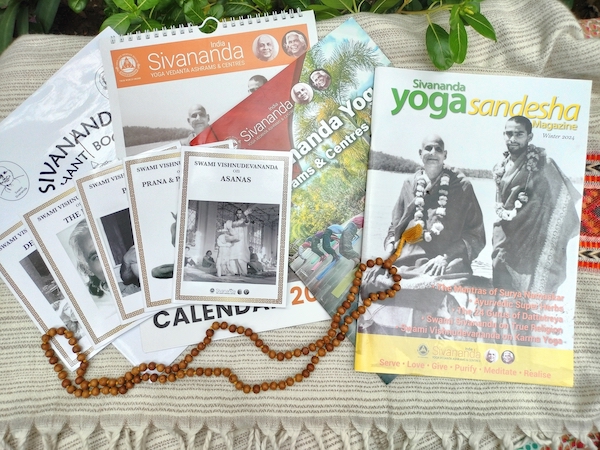
Sivananda Yoga Thailand
Teachers Training Course
1st – 29th October 2023
 |
Come and develop the skills to teach yoga asana, gaining a solid grounding in the classical yoga tradition, and at the same time deepen your spiritual connection to yoga and open yourself to profound inner transformation. In this four-week course you will establish a firm foundation of discipline that promotes physical, mental, emotional, and spiritual growth and build a strong base from which to teach others naturally and with confidence. The Teachers’ Training Course (TTC) is a four-week intensive residential course, based on the ancient gurukula system of India where teacher and student live together. You will be in a traditional Ashram and closely interact with our experienced and dedicated teachers and staff who themselves are immersed in the yogic lifestyle. Connected to an ancient teaching lineage (guru parampara), passed down from guru to disciple through thousands of years, the curriculum is extensive and covers both theory and practice. Devotional practices, traditional to India, are an integral part of the Course.
|
A vegetarian diet, daily personal practice of yoga and meditation, as well living in the stunning natural beauty of India, away from town and city promote an atmosphere conducive to profound learning. The Course was designed by Swami Vishnudevananda in 1969 with the vision to not only develop successful yoga professionals but to also spread peace in the world through them. A sincere desire to learn and openness to yogic techniques is required – a basic knowledge of yoga postures and philosophy is preferred, but not essential. Graduates of the course receive internationally-recognised certification. Certified by the worldwide Yoga Alliance for the 200 hours standard for Registered Yoga Schools (RYS). Students sometimes enjoy occasional Indian cultural programmes that are offered during evening satsangs. Each week there is one day free of lectures. During this day students are required to attend morning and evening satsang. During free time, students can explore the Ashram’s vicinity or join our occasional day trips to places of interest. Attendance at all activities is mandatory. Changes in the programme may occur from time to time.
The course is taught in English with Thai, Japanese and Mandarin Translation.
The TTC is a unique, profoundly transforming personal experience based on the ancient gurukula teaching system which integrates the student’s daily life into the yoga training. For four intense weeks of ashram living, students strengthen their own yoga practice through self-discipline and awareness of the nature of mind, body and spirit while building a firm foundation from which to teach others intuitively and confidently. It is a fantastic opportunity to awaken or deepen your yoga practice, meet old and new friends, and to be a part of the growing global yoga community.
Graduates of the course receive internationally recognized certification that is also accepted by the worldwide Yoga Alliance for the 200 hours standard for Registered Yoga Teachers (RYT).
The goal of this training program is to produce qualified and inspiring yoga teachers who are able to draw on their own practice and personal discipline while imparting the yoga experience to others. The curriculum is based on the five points of yoga which can be understood through the practical application of the traditional four paths of yoga. The intensive daily schedule includes two meditation sessions, two yoga classes, two lectures, and one hour of service to the ashram community. One day a week is lecture-free.
Hatha Yoga (Yoga Postures)
A daily teaching practice class is devoted to how to teach asanas and pranayama. A daily asana practice class gives you the opportunity to practice your own asanas and will help to build the good habit of practice. The daily in-depth practice with individual corrections comprises:
- Sun salutation
- 12 basic yoga postures
- 100 asana variations, from intermediate level to advanced
- Postural alignment
- Physical purification exercises
- Deep relaxation with autosuggestion
- Release of blocked energy
- Ethical and moral principles
- Body as prana (life energy) as mind
- Controlling the body to control the mind through meditation
- Training sessions for all age groups
Teaching Practice
- How to teach the 12 basic postures and breathing exercises to beginners and intermediate students
- Setting up of a proper environment for class
- General pointers on teaching a class
- The Basic Sivananda class
- Beginners’ Course
- Advanced Postures
- Yoga for Children
- Yoga for Seniors
- Yoga for Pregnancy
- Relaxation
- Detailed correction workshops
In the second half of the training course, participants will teach each other under the guidance of an experienced instructor.
Benefits of Asanas
- Control emotions
- Improve power of concentration
- Rid the body of excess fat
- Enhance physical fitness
- Relieve chronic ailments such as constipation, rheumatism, stomach complaints
- Stimulate circulation
- Stabilise thyroid functions
- Keep muscles youthful and supple into old age
Pranayama
- Expands capacity of the lungs
- Relaxes the nervous system
- Balances the two hemispheres of the brain
- Purifies the nadis (subtle energy channels)
- Awakens the inner spiritual energy
- Kapalabhati (lung cleansing exercise)
- Anuloma Viloma (alternate nostril breathing)
- The three bandhas: Jalandhara, Moola, Uddiyana
Yoga Anatomy and Physiology
- Introduction to the major body systems
- The effects of asanas and pranayama on: the cardiovascular system, respiration, digestion, skeletal and muscular systems, endocrine system
- The eight systems of the body
- Diet and nutrition, effects on mind and body, vegetarianism for ethical, spiritual and health reasons, Ayurvedic principles
Yoga Philosophy : Meditation
- What is meditation?
- Why meditate
- 12-step guided daily practice
- Effects of and experiences in meditation
- Mantras as spiritual energy in sound
- Mantra initiation (if desired)
Raja Yoga
- Ashtanga – the 8 steps of yoga
- Antahkarana – functions of the mind
- Concentration and meditation
- Bhakti Yoga
- Kirtan: chanting of classical Sanskrit mantras, correct pronunciation
- Developing a devotional and open hearted attitude
Karma Yoga
- Practicing selfless service as a means to reducing selfishness and egoism
- Community participation
Jnana Yoga
- Basic concepts of Vedanta philosophy
- The 7 bhoomikas (stages of enlightenment)
- The 5 koshas (planes of consciousness)
- Space, time, causation
- The 3 bodies
- The 3 levels of the mind
- Conquest of death
Bhagavad Gita
- Introduction to one of the greatest spiritual texts in the world which contains subtle and profound teachings embracing every aspect of human actions.
- Study of both the text and Swami Sivananda’s commentary
 |
Please note that attendance at all Yoga classes and Satsangs is mandatory. |
| Dormitory | $2500 Single room | $4000 Full payment is required upon submission of the application. After completing the application form, you will be directed to a secure online payment site, where credit card information needs to be filled out. Only Visa and Master card are accepted.Note
For more information, please e-mail Tripti at: [email protected] or call +6689936363303 Refund Policy
|
Materials Included in Course Fee
Materials NOT Covered by Course Fee
Further Recommended Reading For at-home Study
These can be purchased at any of our Centres or Ashrams.
|
What To Bring:
Clothing Depending on the season, it may get quite warm during the day but cold at night. You might need to pack a scarf, cap, warm socks and sweaters. In October Mosquito repellent suitable for tropical regions and long-sleeved clothing for the cool evenings. These items can also be purchased in the TTC Boutique subject to availability. Getting to The Resort Students are responsible for making their own way to the Course. Details on how to get to the Resort are below. The course Initiation starts at 7.30 pm on Sunday, 29th September 2019. Early arrivals : Phu Chaisai Mountain Resort & Spa |
Passport and Visa requirements
Vaccinations & Pharmaceuticals Check with your local health authority for advice regarding vaccinations for visiting Thailand. Please ask your pharmacy for a small kit of medicines appropriate for Thailand. Departure: |
 |
A high degree of self-motivation is required for all aspects of the course. A basic knowledge of yoga postures and philosophy is helpful but not essential. A sincere desire to learn and an openness to the teachings of yoga are required. The practice and especially the teaching of yoga demands a high degree of self-discipline and purity. To ensure the success of the program, participants are required to attend all spiritual activities, meditation sessions, lectures and asana classes. Meat, fish, eggs, black tea, coffee, alcohol, tobacco, drugs and nudity are prohibited during the course as they are counterproductive to yoga practice. Participants who do not comply with the ashram rules may be dismissed from the course. Unfortunately, it is not possible to cater for personal dietary preferences beyond the yogic lacto-vegetarian meals. |
| Check-in/Check-out: On Sunday. The course Initiation starts at 7.30 pm. You are expected to arrive earlier in the day to have time to register, check into your accommodation and to settle down.
Conservation and recycling: Please conserve water while bathing and washing. Report any leaking taps and toilets to reception. Save electricity by switching off lights and electrical items when not in use. Be aware of how much paper products are used. Used batteries can be left at boutique. Any used items of clothing can be donated at reception. Remember: “Every Action Matters” when consciously living in yoga. Dress Code: Please cover the shoulders, upper arm, midriff and legs at all times, including asana classes & especially temple visits. Fire Hazards: Please do not burn candles, incense, mosquito coils, etc. in your room, dormitory or tent. Food: We serve a vegetarian diet, nourishing and balanced with proteins, carbohydrates, fruits and plenty of local vegetables. Snacks are available at our Health Hut during high season. There is no consumption of meat, fish, eggs, garlic and onions. Alcohol, tobacco and any drugs are prohibited. Hygiene: A good yogi leaves the premises, rooms and bathrooms cleaner than when they arrived. For hygienic reasons, please leave your Ashram pillows, blankets and sheets in your room. Karma Yoga: The Ashram is run by volunteer staff members. Selfless service, karma yoga or seva is an essential part of the Ashram experience. Maintaining a positive spiritual atmosphere requires participation from all the guests and staff. In addition to staff duties, we ask all students to participate for 1 hour each day contributing to the upkeep of the Ashram. A small task can make a big difference. Karma Yoga task shall be explained in the class. Laundry: An independent and affordable laundry service is available between 10.30 – 11.30 and 18.30 – 19.30 from the resort with additional charges. Lights out: Kindly respect the silent time after evening satsang on your way to your room. Please turn all lights out and observe silence by 10:30 pm to ensure everyone a peaceful rest. Personal Belongings: Valuables may be stored in the Reception safe. Valuables are stored at your own risk. Do not leave valuables in the dormitories and huts. Internet & Phone calls: An Internet facility is available through Wi-Fi and can be used only during the free times as fixed by the management. *subject to availability and changes of timings. Phone call options are available at the Resort reception. Cell phones: To ensure a full Ashram experience we ask that all cell phones are set to silent and/or are turned off. Making or awaiting phone calls or text messages can distract a yogi and their friends from their yoga practice. The Boutique has alarm clocks or perhaps follow the Ashram bell to guide you through the day. Photography: To ensure people’s privacy during their stay, photography or video recording is not permitted during satsang, pujas, or asana classes. See Ashram Director with any questions. |
Punctuality: For everyone’s benefit, kindly arrive to classes, events and satsangs on time or even arrive a little early to settle. Leaving your room at the 10-minute bell will help you arrive on time. Punctuality ensures peace for all for the beginning of any event.
Travel Agent: The resort cannot change foreign currency, cash or travellers’ cheques. For travel assistance and currency exchange, you may travel to the local town on the day off. Post: You can leave any outgoing mail at reception. If you are expecting any mail, check with reception. Relationships: Kindly restrain expressions of affection in public, such as kissing and hugging. Women and men’s dorms: kindly respect the gender privacy of these dorms. Couples are advised to observe celibacy as part of the spiritual discipline. Spa and Swimming Pool: Spa and Swimming pool are available at the resort for all students. Kindly wear discrete swimming clothes in the spa and pool. Shoes: Please remove your shoes and place them on the shoe racks when entering any of the buildings. Schedule: It is expected that all students attend all satsangs, lectures and asana classes. To help with the upkeep of the Ashram we ask all students participate for 1 hour of Karma yoga each day. Silence: To maintain the tranquil setting of an Ashram we aim to observe personal silence before the morning and evening satsangs and especially at mealtimes. Maintaining silence conserves energy and instills a peaceful environment. To maintain the energy received during evening satsang try observing silence for the remainder of the night. Spiritual Respect: Kindly maintain a respectful attitude when near an altar, satsang hall or temple. When sitting, sit cross-legged, or in a chair. Kindly refrain from pointing the feet towards any altar, deities or teachers during satsang and lectures. Kindly do your best to remain in the satsang hall for the entire satsang. Staff: Staff members are willing and able to answer any of your questions. Feel free to go to them and ask your questions. They will most often be wearing yellow and white. Suggestions, Comments & Special Requests: If you have any suggestions, comments or special requests, feel free to write them down with your name and drop them into the suggestions box at reception. Any immediate concerns, feel free to mention to any staff member. Physical Harassment: The Sivananda Yoga Vedanta Centers of Canada disapprove of and condemn any form of harassment directed at guests, staff or visitors. Specifically, no harassment, proposals or innuendos with a sexual connotation will be tolerated during any program or activity organized by the Sivananda Yoga Vedanta Centers of Canada. Guests participating in such programs are accordingly made aware of this policy and invited to apply it in their personal behavior whilst on our premises. Any guest who thinks she (he) may be the victim of unsolicited advances or any other form of sexual harassment is asked to notify a senior Swami or Director immediately in order for corrective action to be undertaken without delay. Complaints made to a senior Swami or Director will be treated confidentially and the alleged violator or any third party will not be advised of the complainant’s identity without the latter’s consent. |

